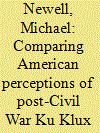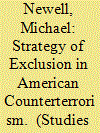| Srl | Item |
| 1 |
ID:
174713


|
|
|
|
|
| Summary/Abstract |
Recently, public debates have questioned whether or not the American government responds differently to terrorism by white, right-wing, Americans. This article examines a historical period in which similar dynamics were on display in state responses to the Reconstruction-era Ku Klux Klan (KKK), Irish-American Fenians, and anarchists from 1860 to 1920. This history suggests that political officials responded to these groups more on the basis of ideas than their actual levels of violence, including discourses of Americanism shaped by ideology, nativism, and racism. Successful claims to ‘Americanism’ lent the KKK a sense of familiarity that led it to be seen as less of a threat to ontological security, even as it posed a significant threat of physical violence. In contrast, the ideologically subversive and foreign anarchists were responded to more severely, despite being responsible for far fewer deaths and injuries than the KKK. This history suggests that American counter-terrorism has been influenced by factors of racial and national belonging in the past, and provides significant context for the consideration of current debates about responses to right-wing groups.
|
|
|
|
|
|
|
|
|
|
|
|
|
|
|
|
| 2 |
ID:
168391


|
|
|
|
|
| Summary/Abstract |
While garnering heightened attention following the Trump administration's travel restrictions, exclusionary tactics in counterterrorism have a much lengthier history. Given that some terrorism studies scholars identify social and political exclusion as an explanation for the resort to terrorist violence, the selection of a strategy of exclusion is significant. In this article, I identify the elements of a strategy of exclusion and the logic behind this strategy. In particular, I examine the origins and persistence of this strategy in the U.S. context. Rather than a contemporary anomaly, exclusion was among the first strategies the United States added to its counterterrorist tool-kit, and has remained among the most consistent strategies relied on. I trace the history of this strategy from its origins in immigration restrictions passed following the assassination of President McKinley by an anarchist through the contemporary War on Terror. Controversy surrounding this strategy, its negative effects on nonviolent immigrant populations, and its failure to prevent further acts of terrorism suggest it was historically ineffective and may also be so today.
|
|
|
|
|
|
|
|
|
|
|
|
|
|
|
|